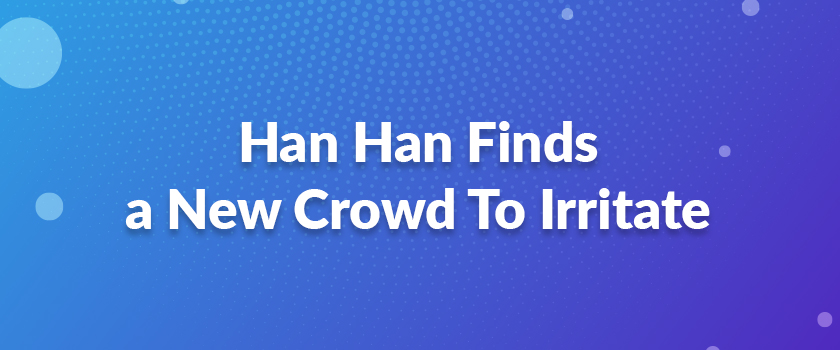Han Han, the Chinese writer-celebrity, has spent a decade and a half enraging China’s conservatives and neo-Maoists. Last year around this time, a pro-government Web site named him one of the “slaves of the West” and superimposed a noose on his photo. Now, for precisely the reasons that made Han interesting enough to profile in the magazine in July, he has widened the pool of his opponents to include some of those who once admired him: China’s most ardent democrats.
Han Han, the Chinese writer-celebrity, has spent a decade and a half enraging China’s conservatives and neo-Maoists. Last year around this time, a pro-government Web site named him one of the “slaves of the West” and superimposed a noose on his photo.
Now, for precisely the reasons that made Han interesting enough to profile in the magazine in July, he has widened the pool of his opponents to include some of those who once admired him: China’s most ardent democrats.In a series of three blog posts beginning on December 23rd (Roland Soong has provided free translations), Han has spelled out in stark terms his views on some of the big questions. “On Revolution,” “On Democracy,” and “Wanting Freedom” appeared on his site—one of China’s most popular blogs—and left little doubt that he was distancing himself from the kind of intellectuals who brought flowers to the Czech embassy to memorialize Vaclav Havel.
“A Velvet Revolution will not take place in China,” he wrote in one piece. “The ultimate winner in a revolution would be a vicious, ruthless person,” he wrote in another.He knew full well that this would lead to howls. (“Did the government pay you a stability-maintenance fee to say that?” he asked himself in a mock Q. & A. in “On Democracy.”)
And the response was swift: Ai Weiwei, the dissident artist who once said that Han had the makings of “another Lu Xun,” wrote after the latest essays that Han’s lament “lacks honest discourse and is too acquiescent. [It’s] almost predicated on flattery. It’s biased and degraded, like he has surrendered voluntarily.”
Invoking the name of China’s nationalist state-run paper, Ai said, “It would be a good piece for Global Times to publish.” (For an excellent roundup of the response, see the blogger John Kennedy’s post at the site, Global Voices.)It is a measure of Han’s influence that he did more to spark a debate over censorship, dissent, and revolution than did the news that two Chinese dissident writers, Chen Wei and Chen Xi, have been sentenced to unusually long sentences of nine years and eleven years, respectively, for posting essays online.
But it’s a mistake to imagine that Han’s views represent a change in what he believes. In a series of conversations with me last winter and spring, he made many of the same points: that a Chinese election would be dominated by the wealth and power of the Communist Party, that “it’s too early to talk about democracy,” and that most citizens are willing to avoid activism on the belief, as he put it, that “as long as I don’t talk about a number of things, I’ll be fine and I can go make money.”
The reason his comments have sparked such a fury online is that Han has rejected the projections that others had on him. He has made it increasingly difficult for people to imagine that China’s most popular young blogger is a democrat. He has crafted a blinking neon sign out of his belief that the middle class is unprepared for radical change.
He writes:In the mighty torrent of the revolution, if you own an Apple iPhone, or you drive a motorcycle, or you know how to use the Internet, or you read newspapers regularly, or you eat at K.F.C., you are the rich criminal who will be the target of the revolution.
The person who has a hundred million yuan in assets is safer than the person who has only ten thousand yuan in assets. The former can immigrate overseas and pick up his New York Times delivered to his home door, but the latter (mostly middle-class and petty bourgeois) is stuck here.
The most striking element is the depth of his cynicism:Even if the social conflicts intensify tens times over, even if you have ten Havels speechifying in ten cities and even if the authorities don’t act, those speeches will eventually end up being sponsored by a lozenge manufacturer.
And what makes that bleak is that the spirit he conveys is squarely in the mainstream. Alice Xin Liu, a Beijing-based editor of Pathlight, a journal of translated Chinese literature, tweeted: “Anyone who’s lived in China know this is the more widely held opinion.
”These posts will probably make him more popular, not less, even though Han takes a dim view of his fellow citizens. In his view, they are self-absorbed, utilitarian, and atomized. To his credit, he does not except himself from that description. But one can’t help but wonder if Han is too certain in his beliefs. He is no longer a wunderkind, but he has yet to travel widely or read in a language not his own or engage in serious debate with people outside his circle.
So he underestimates the effect this might have. “There isn’t much to say about Han Han’s piece ‘On Revolution’ except that he needs to read more,” Michael Anti, the Web activist and blogger, wrote.That is the enduring oddity about Han. People have always expected more of him.
Twelve years ago, when he was seventeen years old and his début novel about the suffocating constraints in Chinese education had made him a celebrity, he appeared on a Chinese state-television broadcast and sat through an hour of criticism from education experts and audience members.
When he squirmed, the host told him to get used to it. “You are a public personage now, like the American President,” she said. “People will have all kinds of demands of you.”
Via:newyorker



